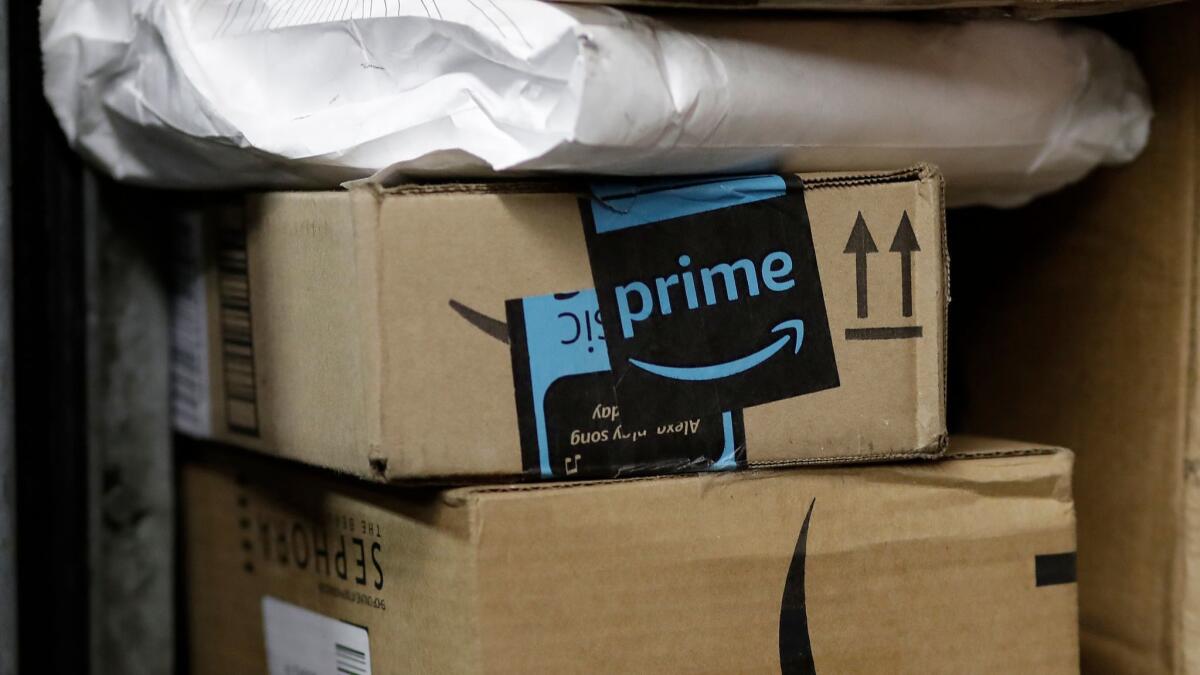Amazon stops ordering from many suppliers, pushing them to bear the risks instead

- Share via
Amazon.com Inc. abruptly stopped buying products over the last two weeks from many of its wholesale vendors, encouraging them to instead sell their products directly to consumers on Amazon’s marketplace.
It’s the company’s latest move to boost profits at its core e-commerce business, even if that means disrupting relationships with longtime suppliers and potentially limiting customers’ choices. Thousands of vendors are affected, according to estimates from consultants who help clients sell on Amazon.
Pushing suppliers onto the marketplace — rather than selling their products itself — lets Amazon offload the risk and costs of buying, storing and shipping the merchandise. Instead, the company can charge suppliers for these services and take a commission on each transaction, which is much less risky. The strategy is part of a larger effort to reduce overhead by getting more suppliers to use an automated self-service system that requires no input from Amazon managers.
“We regularly review our selling partner relationships and may make changes when we see an opportunity to provide customers with improved selection, value and convenience,” Amazon said in an emailed statement, declining to answer specific questions about the move.
The abrupt cancellation of orders was a big topic of conversation this week at the ShopTalk retail conference, which drew more than 8,000 retailers, brands and consultants to Las Vegas. Some attendees said Amazon stopped submitting routine orders last week for a variety of products, often without explanation. The drought continued this week, affecting more vendors and leaving them frustrated about the lack of communication from Amazon.
One vendor who has been selling products to Amazon for five years said he got a canned response when he inquired why his routine weekly purchase order never came through. The response gave him no clarity about his standing as a vendor, he said.
Because many suppliers source products from manufacturers months in advance, they’ll have to quickly shift their sales tactics if the expected Amazon orders don’t come in.
“If you’re heavily reliant on Amazon, which a lot of these vendors are, you’re in a lot of trouble,” said Dan Brownsher, chief executive of Channel Key, a Las Vegas e-commerce consulting business with more than 50 clients that sell more than $100 million of goods on Amazon annually. “If this goes on, it can put people out of business.”
Brownsher and other consultants said Amazon’s move has affected thousands of vendors.
In recent years, Amazon has increasingly prioritized its marketplace. More than half of the products sold on the website in 2018 came from marketplace merchants, and revenue-providing services to those merchants is growing at twice the pace of revenue from the online store. Based on the target valuation of Amazon, the marketplace business is worth about $250 billion, according to Evercore ISI analyst Anthony DiClemente — more than double the value of the online retail business.
Online marketplaces can offer greater selection than even the biggest of stores. Walmart Inc., Target Corp. and Best Buy Co. are all copying Amazon’s marketplace model to increase online sales. Amazon will generate e-commerce revenue of $317 billion this year, representing 52.4% of all online sales in the United States, according to EMarketer Inc.
“If you’re already drawing eyeballs to your website, you want to have all of the products your customers are looking for,” said Frank Poore, chief executive of CommerceHub, which sells online marketplace software. “You have to have a bigger assortment online than you do in the store.”
Now more Amazon vendors will have to sell on the marketplace or risk getting stuck with unsold inventory, said Will Land, CEO of Marketplace Valet, an e-commerce logistics provider and consulting firm in Riverside.
“When you get used to those big checks,” he said, “it’s hard to pull away.”
More to Read
Inside the business of entertainment
The Wide Shot brings you news, analysis and insights on everything from streaming wars to production — and what it all means for the future.
You may occasionally receive promotional content from the Los Angeles Times.










